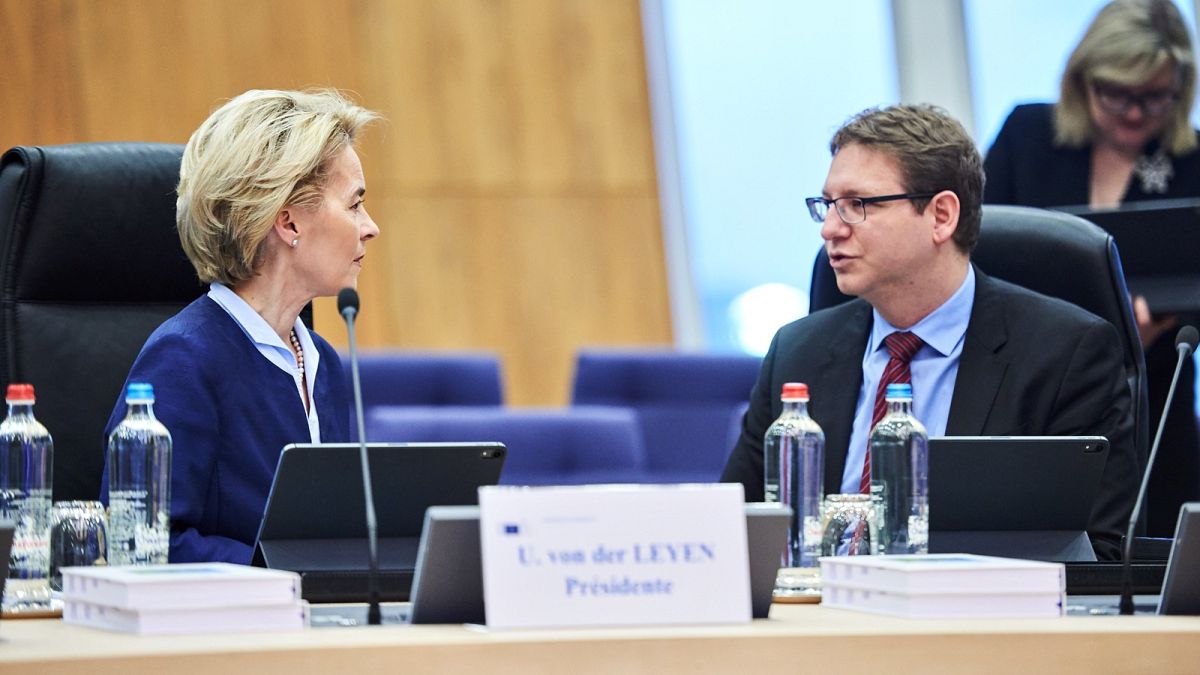Von der Leyen picks chief of staff as campaign manager, raising eyebrows
Ursula von der Leyen has selected her current chief of staff to run her campaign ahead of the elections to the European Parliament. Bjoern Seibert, a highly influential power broker in Brussels, will act as campaign manager from 8 April until the conclusion of the continent-wide elections on 9 June. Alexander Winterstein, a high-ranking official […]


Ursula von der Leyen has selected her current chief of staff to run her campaign ahead of the elections to the European Parliament.
Bjoern Seibert, a highly influential power broker in Brussels, will act as campaign manager from 8 April until the conclusion of the continent-wide elections on 9 June.
Alexander Winterstein, a high-ranking official in the European Commission’s communications department, will serve as chief spokesperson during the same period.
The announcement was made on Friday morning by the centre-right European People’s Party (EPP) and immediately raised ethical questions, given the two appointees hail from an institution that, according to the treaties, is independent of partisan politics.
Von der Leyen is herself not vying for a seat in the hemicycle but standing as the EPP’s lead candidate to preside the Commission for a second five-year term.
Under the so-called Spitzenkandidaten system, the party that wins the most seats is “entitled” to send its lead candidate to the top of the powerful executive. Von der Leyen did not run as a Spitzenkandidat in 2019 and her out-of-the-blue appointment by EU leaders enraged the Parliament, which approved her by a razor-thin margin.
This time, however, she intends to play the game. Von der Leyen was declared the EPP’s lead candidate in early March during a congress in Bucharest where she faced no competition. This means she is now an official contender in the electoral cycle and is expected to participate in debates, media appearances and political rallies in her capacity as Spitzenkandidat, rather than president.
Anticipating the conflict between partisan candidate and independent president, the Commission published earlier this year updated guidelines to strictly separate both functions. These include the creation of dedicated social media accounts, the obligation to be available for official duties and the prohibition of using EU resources for the campaign, as well as transparency requirements and declarations of interests.
Following the rules, Seibert will be on unpaid leave between 6 April and 9 June, as the guidelines forbid von der Leyen from employing him in a dual position. Seibert will resume his job as head of cabinet on 10 June, the Commission said in a statement.
But 10 June does not mark the end of von der Leyen’s campaign. After all the ballots are counted, EU leaders will meet in a crucial summit to distribute the top jobs: European Commission president, European Council president and High Representative.
With the EPP projected to come first in the elections, von der Leyen is all but guaranteed to receive the greenlight from leaders. Her appointment will then need to be approved by an absolute majority in the Parliament, a goal that will require von der Leyen to ditch her role as EPP nominee and seek to build a consensus around a common agenda.
During this process, the other pro-European parties – socialists, liberals and greens – will assail von der Leyen with their must-have priorities and push her into accepting as many of their flagship proposals as possible in exchange for their positive votes. This will be a complex, delicate endeavour that will make von der Leyen rely on her close advisors.
Among them will be Seibert, her right hand. But during this second stage, between 10 June and mid-September, when the Parliament is expected to hold the confirmation session, Seibert will act as head of cabinet – not as campaign manager.
“The guidelines apply to the European elections. And therefore that is what the staff of the Commission and the members of the College have to have to comply with. It’s very simple,” Eric Mamer, the Commission’s chief spokesperson, said on Friday.
“After that, he (Seibert) is free to come back to the Commission,” he added.
Facing a barrage of questions from journalists, who asked whether this represented a legal loophole and a possible conflict of interest, Mamer doubled down on his answer and said the “key moment” of the cycle was the June elections, when voters exercise their democratic rights, not the subsequent phase between the European Council and the Parliament, which he described as a “more institutional” and “distinct process.”
He said no additional rules will be imposed for that second stage of negotiations.
“I don’t know how many times you want me to say this: these are rules related to the elections,” he told journalists. “Despite my understanding of your question, the rules that exist apply to this. You may consider that they should apply to something else. My role as a spokesman is to tell you that the rules apply to that context, and then we can see.”
The concerns around Seibert’s appointment come the same week as von der Leyen faces growing scrutiny for selecting Markus Pieper, a German lawmaker from her same party, to the position of SME Envoy, which carries a monthly salary of €17,000.
MEPs are gearing up to call for Pieper’s resignation while four European Commissioners have demanded an internal review of the procedure, which reportedly saw Pieper score lower than the other two final aspirants.














